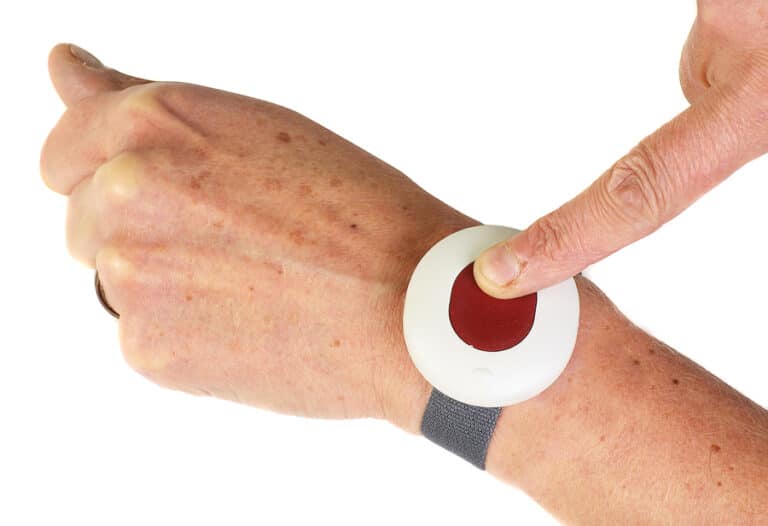
Approximately 5.5 million people throughout the United States are currently living with Alzheimer’s, and of those, 60 percent will develop wandering tendencies at some point in their progression. If these elderly adults wander and are not found within 24 hours, they are at seriously increased risk of severe injury or even death. As a family caregiver this means that you need to be as vigilant as possible about your loved one’s condition and well-being, and take the steps necessary to keep them secure and safe as they age in place. This does not mean limiting their independence. Independence is a concept that is extremely important to all people, including elderly adults, and makes a tremendous impact on mental health and well-being. Encouraging your loved one with wandering tendencies to stay safer while also promoting independence is an important step in protecting your senior’s health, safety, and security while still encouraging the highest quality of life possible.
Use these tips to help keep your aging loved one safe while also promoting independence even as they deal with wandering tendencies:
- GPS. Wearable GPS technology can be some of the most effective tools that you can use to protect your elderly parent when they are dealing with wandering tendencies. Look for bracelets, pendants, and even shoes that are equipped with this technology so that you can quickly and easily track your parent’s location and movements and find them if necessary.
- Senior ID kit. Help to make it faster and easier to locate your loved one by creating a senior ID kit. This includes having accurate recent pictures of them readily accessible and a list of identifiable features, such as scars, tattoos, or other characteristics. If your parent wanders, you can then share this information with emergency personnel so that they can help you to find them more efficiently.
- Promote activity. One of the most common reasons that elderly adults wander is simply because they are bored and restless. Promote more activity with your senior to relieve these feelings and encourage their mind to stay as active and engaged as possible. Encouraging them to volunteer, participate in clubs or other organizations, and spend time with friends and family are wonderful ways to promote more independence while also keeping them safe and secure.
If your elderly loved one has recently been diagnosed with Alzheimer’s disease, you are concerned about their health or safety when they are in their home alone, or you simply feel that they would benefit from additional care and support, now may be the ideal time to consider starting home care for them. Caring for an elderly adult with Alzheimer’s disease is extremely challenging, but the highly personalized services of an in-home senior care services provider can ease your stress and help ensure your elderly parent gets all of the care, support, encouragement, and assistance that they need to help them through their progression. This includes being with them on a customized schedule. Whether they need extensive care and you live at a distance or they only need some moderate support and you can be with them much of the time, this customization allows both of you to feel confident that they will get exactly what they need to stay as healthy, comfortable, safe, and happy as possible throughout their later years. This can be particularly important if your parent has developed wandering tendencies. Knowing that there is an in-home senior care services provider in the home with your parent can give you confidence that they will remain secure and reduce their risk of serious consequences related to this particular issue of dementia.
If you or an aging loved one are considering home care in Arlington, VA, contact the caring staff at Access Home Care Inc. Proudly Serving Northern Virginia and Surroundings for over 12 years. Call Us: (703) 765-9350
Sources:
http://www.alz.org/facts/
http://www.alz.org/norcal/in_my_community_18411.asp
“My desire to enter into nursing started when one of my older sisters died of kidney disease due to lack of care. At age 15, I decided to enter into nursing so that I could provide quality care to patients.Upon arrival in United States at 21 years of age, I enrolled in T.C Willliams School of Practical Nursing while working as a nursing assistant at a nursing home. I also worked as a part-time home health aide to take of the elderly. After completion of my practical nurse education, I worked in geriatric psychiatry unit at Dominion Hospital and Arlington Correctional facility mental health unit.
I completed Marymount University in 2001 and entered into Home Care as a field case manager.
I held that position for 2 years and as an Administrator, and for another 2 years until Access Home Care was found in 2004."
Today, Access Home Care has over 300 employees and 286 clients.
- Five Tips for Living with Chronic Lower Back Pain - April 3, 2025
- How 24-Hour Home Care Is Different From Other Types Of Care - March 19, 2025
- Four Symptoms of Advanced Multiple Sclerosis - March 5, 2025



